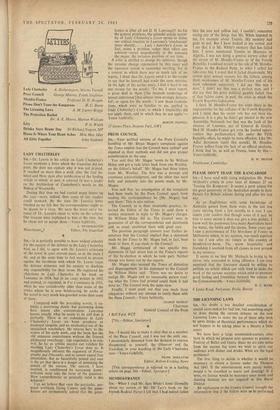PRESS COUNCIL
SIR.—Your garbled version of the Press Council's handling of Mr. Bryan Magce's complaint against the Times implies that the Council were carless• and slipshod in their methods and did not give proper consideration to the case.
You said that Mr. Magee 'wrote to Sir William Haley and got a rude letter back from one Woolley, on the Editor's behalf.' Mr. Magee had three letters from Mr. Woolley. The first was a prompt and courteous acknowledgment, and the other two went fully and patiently into the points made by Mr. Magee.
You said that 'no investigation of the complaint had been made by the Press Council apart from reading the correspondence he [Mr. Magee] had sent them.' This is also untrue.
The Council, as is their invariable practice, in- invited the Editor of the Times to send them a written statement in reply to Mr. Magee's charges. Sir William Haley did so. The Council were in possession of all the correspondence and statements and, as usual, examined them with great care.
The previous paragraph answers your further in- accuracy that the Council implied that a statement made by the Times to Mr. Magee had, in fact, been made to them. It was made to the Council.
Mr. Magee complained of two specific mis- statements of fact about him in the Times's reports of the by-election in which he took part. Neither charge was borne out by the reports.
Mr. Magee also accused the Times of distortion and disparagement. In his statement to the Council Sir William Haley said : 'There was no desire to malign Mr. Magee and no reasonable person read- ing what the Times had printed could think it had done so.' The Council. took the same view.
Finally, I must point out that you made these allegations without any attempt to verify them with the Press Council.—Yours faithfully, GEORGE MURRAY Chairman General Council of the Press 1 Bell Yard. WC2 ['Sic.—Editor, Spectator.]






































 Previous page
Previous page